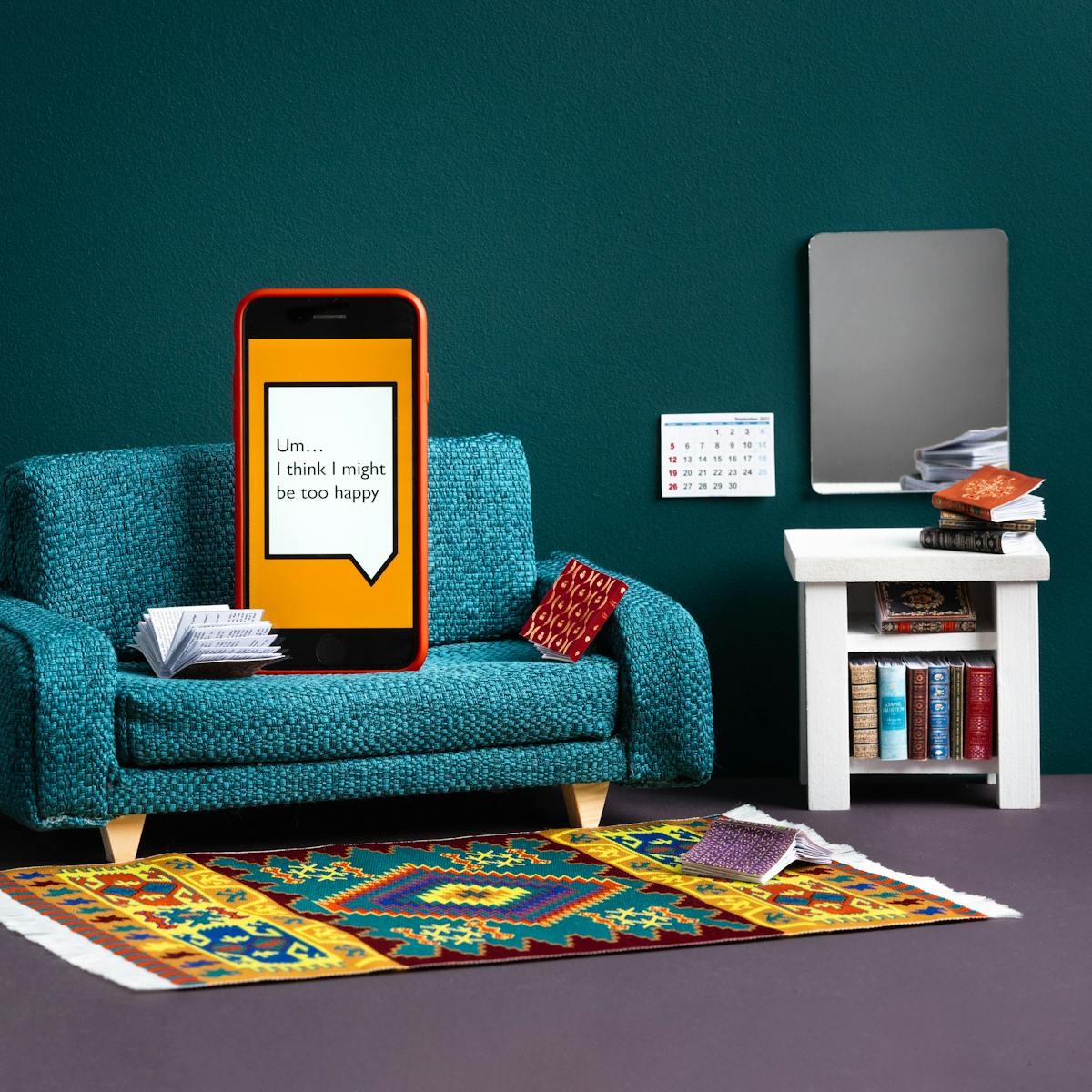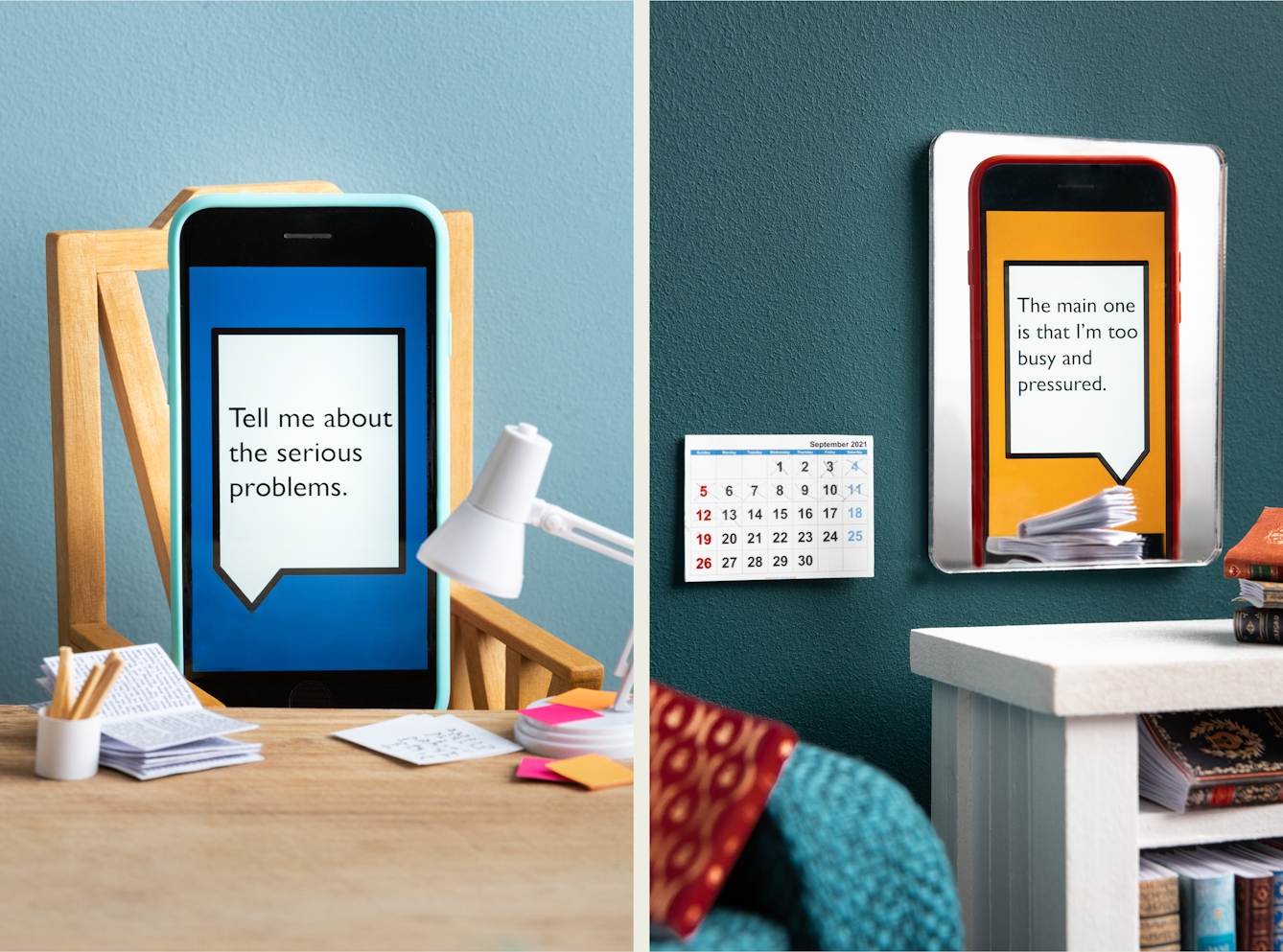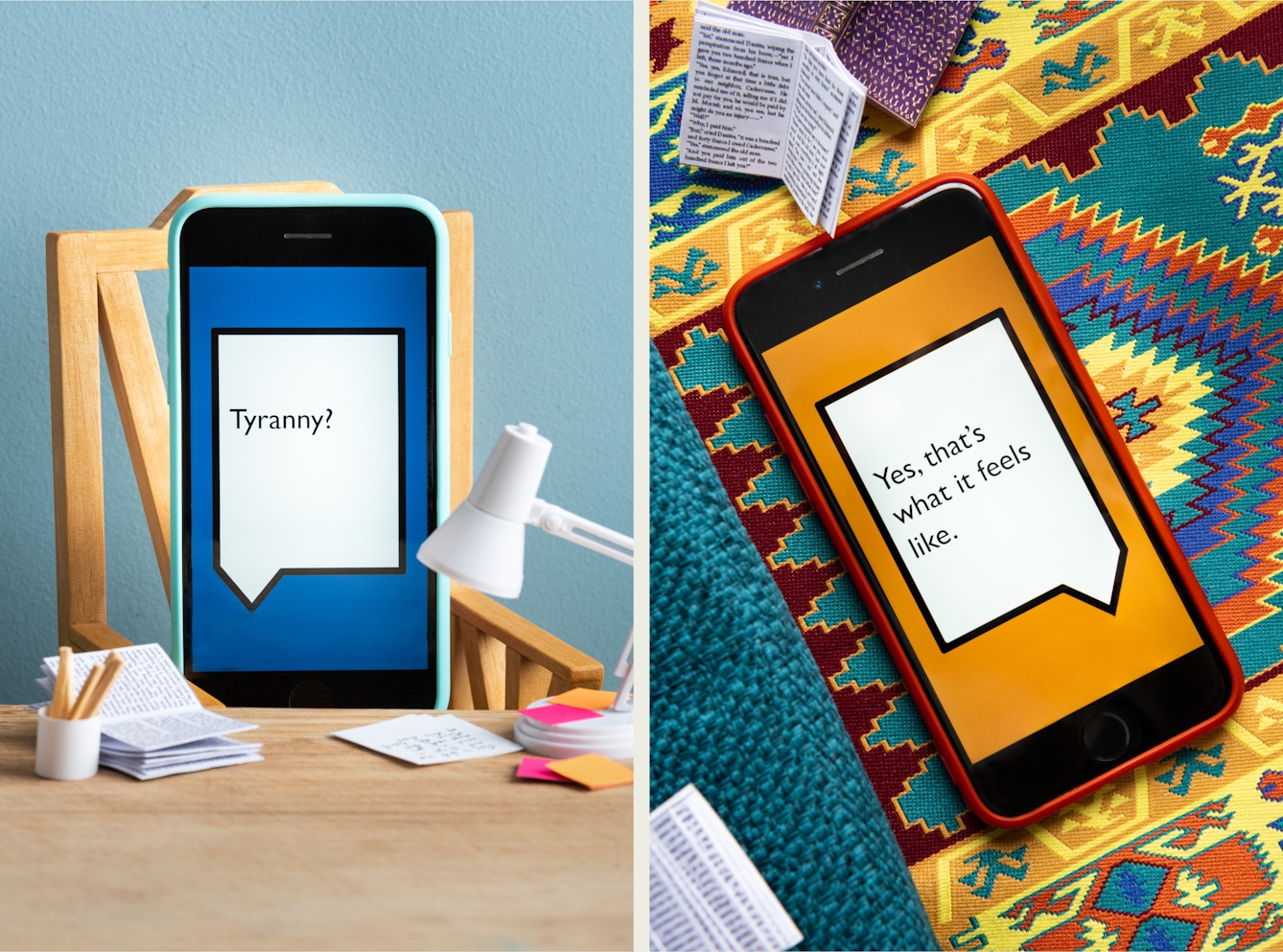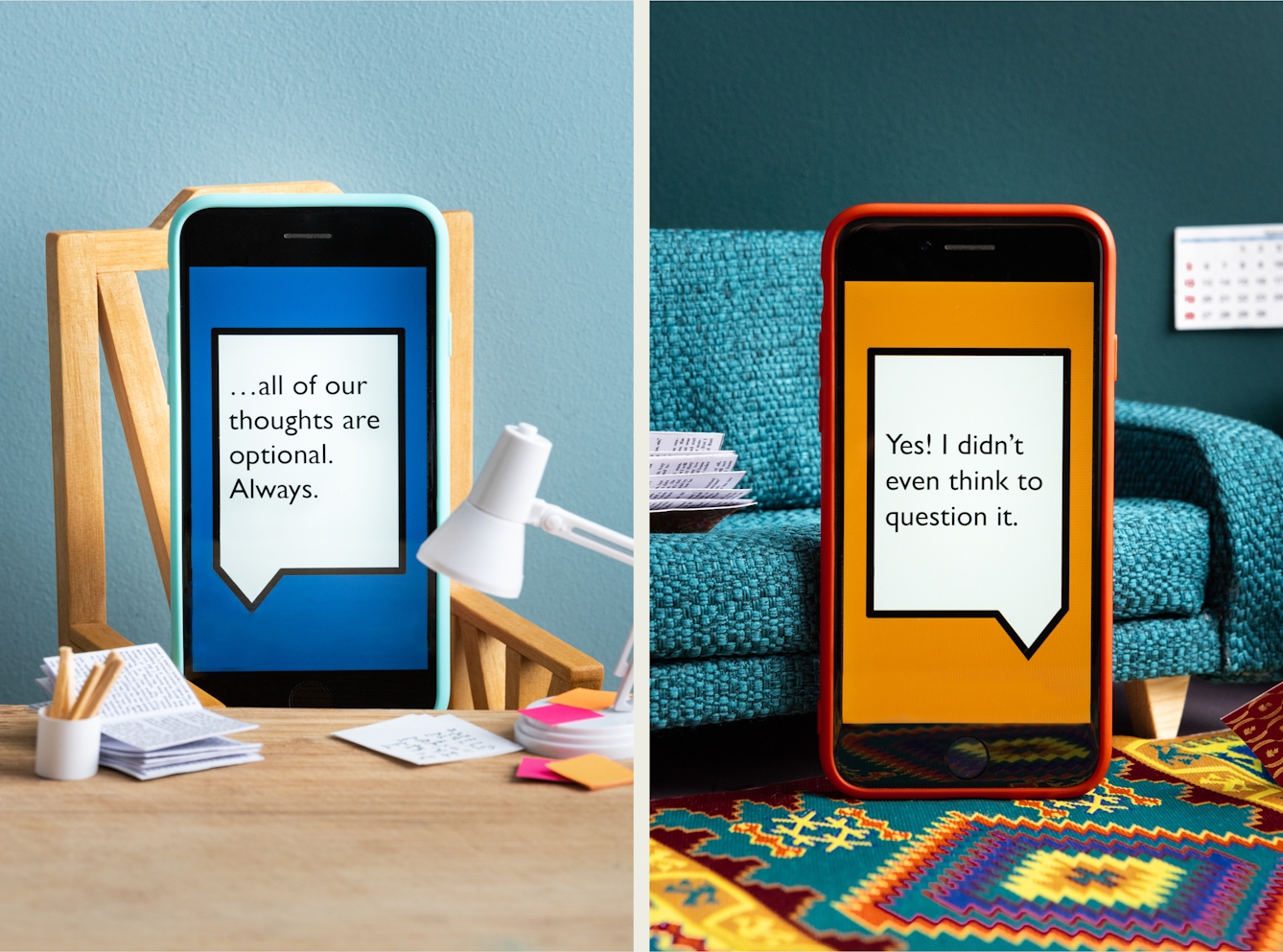In ‘Happiness, A Mystery’, bestselling crime writer Sophie Hannah draws on decades of experience observing other people to offer an unique guide to happiness, collecting the clues that can lead us there. In this extract, Sophie confesses she might actually be too happy. Worried she’s using her happiness as an excuse to avoid a big work problem, she turns to a life coach for help.
Solving the mystery of how to be happy
Words by Sophie Hannahphotography by Steven Pocockaverage reading time 10 minutes
- Book extract

Her name is Katherine. I find her online, and see that she offers life coaching via Skype, which is brilliant and convenient, because she lives in America, and I live in Cambridge, England.
“Let’s begin,” she says. “What do you need help with?”
It’s ten o’clock at night in England; earlier in America. I’m nervous about the conversation we’re going to have, in a way that I’ve never been when I’ve spoken to English psychotherapists face to face.
Me: Um… I think I might be too happy.
Her: Too happy?
Me: Yes. But in a way that could be a problem.
Her: Can you—
Me: Yeah, I’ll explain. I’ve always had a happy temperament, just naturally. I wake up feeling extremely happy every day, unless there’s a specific upsetting problem. But that’s not often, so I’m basically happy most of the time. Even when there’s a problem, I’m so good at deciding that it’s a mild or easily solved problem and making myself happy again that… I suppose what I’m saying is, I reckon I have some serious problems that I’m in danger of never solving because I’m happy in spite of them. So I don’t suffer enough, which means I don’t address the issues.
Her: Tell me about the serious problems.
Me: The main one is that I’m too busy and pressured. I mean… incredibly busy and pressured. All the time.
Her: What kind of busy? Work? Family commitments?
Me: Mainly work. Everything else is manageable, or it would be if it wasn’t for work.
Her: What’s your job?
Me: I’m a writer. I write contemporary crime novels, psychological thrillers. And I also write… have you heard of Agatha Christie’s famous Belgian detective, Hercule Poirot?
Her: Of course.
Me: Well, for the past few years I’ve been writing new Hercule Poirot novels as well as my other crime novels. And recently, I agreed to a teaching gig that was too tempting and exciting to turn down, and I’m about to launch a coaching programme for writers, and I’ve co-written two murder-mystery musicals and toured one of them around literary festivals, and there’s a lot more of that coming up…

Life coach 01.
And, I mean, I absolutely love doing all these things. That’s why I do them all. I keep saying yes to new, exciting projects, and I’m really happy to be doing them. And I make sure I spend lots of time with my family, just hanging out, and doing the things I love doing, like swimming, seeing friends, reading, watching movies.
Her: It all sounds great to me. Are you sure there’s a problem?
Me: I mean… not entirely, but I think there is, yes.
Her: What is it, then? You say you have time for your family and for relaxing…
Me: Yes. I’ve never been willing to sacrifice the rest of my life, no matter how much I love my work.
Her: I’m still not clear what the problem is.
Shit. Is it possible that I don’t have a problem? Am I a fraud, wasting the time of a life coach who could be helping someone in greater need of her services? No, no. Calm down. There’s definitely a problem. I’m not on this Skype call under false pretences.
I reckon I have some serious problems that I’m in danger of never solving because I’m happy in spite of them.
Me: It’s easiest to describe if I give you specific examples. Like… the other day, I was properly, genuinely pleased when I worked out a way of washing my face and brushing my teeth at the same time. I saved between seven and ten seconds by thinking of them as one process instead of two and washing my face around my toothbrush.
Her: Okay…
Me: I thought, “Amazing! I’ve saved ten seconds.” I spend a lot of my life feeling like that guy from ‘The Bourne Identity’ who has to keep running all the time or else he might die…
In order to stay afloat with all the things I’ve committed to do – all the things I really want to do – I have to do a certain number of tasks every day, and it’s more tasks than I can do in a day unless I’m constantly trying to save minutes and seconds. Unless I’m in Bourne Identity mode. My life has been like this for so long, it’s become my automatic way of being.
Her: All right. Then I agree, you have a problem.
Shit. An American life coach with bouncy hair and bright white teeth and walls thinks I have a problem.
This is terrible. I feel worse, because now my problem is official – made so by a wellbeing professional – and I have no time to solve it. Still, there’s always an upside: it’s nice to be proved right.

Life coach 02.
Feeling that work is a tyrant
Her: I have trouble believing that you’re as happy as you say you are, when you’re so overloaded with work. That sounds like an impossibly pressured life. You said you spend lots of time with your family, relaxing – are you sure that’s true?
Me: Yes. Every day, between 6.30 p.m. and 10.30 p.m., I’m with my family, not working. But then when they all go to bed, I do between two and five hours more work to catch up. And I resent having to live in this ridiculous way, so I do quite a lot of skiving off, to escape the tyranny.
Her: Tyranny?
Me: Yes, that’s what it feels like. I feel really tyrannised by the amount of work I have to do and the time I have in which to do it.
Her: Could there be a really simple solution to all of this?
Me: There is. I need to take on less work. Commit to doing fewer things, stop putting so much in my schedule. I need to plan more realistically, look after myself better and do less.
Her: Okay, great. So you have a problem and you have a solution.
Me: I can take on less from now on, and I will in future, but that doesn’t help me in the short to medium term because…
At this point I break off. I can’t bring myself to tell her that I’m overcommitted and over-scheduled until the end of 2021.
Her: Yet you say you’re happy.
Me: Yes. I’m very happy. There is one small blight on my happiness, which is what we’ve been discussing. It doesn’t make me unhappy, but I’d like to solve the problem. I want to get rid of this feeling that my work is kind of… taunting and bullying me even during my non-working hours, and I don’t want to remove it by cancelling any of my commitments. I never used to feel this way.
Her: You can easily remove the negative feelings you’re having, without cancelling anything.
Me: I can? How?
Her: If you didn’t feel stressed, oppressed, tyrannised, bullied and stalked by your work commitments, would you be perfectly happy?
Me: Yes! I really would.
Her: Then you easily can be.
Me: How? How do I solve the problem? Because – and I am happy in spite of it, I really am – but I have a strong sense that if I don’t solve the problem, some big unhappiness might be coming my way at some point fairly soonish. That’s just a hunch, but… it’s there.
I can’t bring myself to tell her that I’m overcommitted and over-scheduled until the end of 2021.

Life coach 03.
Her: Do you know that you don’t ever have to change your circumstances in order to feel better or happier?
Me: Oh! Yes, I mean, kind of. I listen to lots of life-coaching podcasts, so I know that our feelings are caused by our thoughts, not by our external circumstances, but—
Her: Yes. And all of our thoughts are optional. Always. You are choosing to think that your work commitments are stalking you and oppressing you. You needn’t think any of that.
Me: Oh, my God. Are you saying—
Her: If you dropped that thought – that belief that your work is a tyrant, bullying you – how would you feel? If you didn’t believe that at all? If you thought instead, “I have plenty of time for everything I want to do. There’s no pressure. There’s no rush.”
Me: I can’t believe I’ve heard this mentioned so many times on life-coaching podcasts, but I’ve never thought to apply it to my own situation. I thought—
Her: You thought it was just the truth, right? It’s an objective fact that you don’t have enough hours in the day? It’s an objective fact that your work’s oppressing you and stalking you, even during your leisure time?
Me: Yes! I didn’t even think to question it.
Her: Well, you should, because it’s not the truth. It’s just a story you’re telling yourself and you’re choosing to believe it. If you want to be happier than you are now, and solve your problem, nothing needs to change about your life situation. Only your thoughts need to change.
Choose new thoughts: “In future I might commit to fewer projects, but for now, I’ll pursue all my projects happily, unhurriedly, and knowing that I always have enough time. My work isn’t a problem. I have no problems.”
If you practise thinking thoughts like that, you’ll be fuelled by a calmer energy. You’ll feel less stressed and be able to get more done. Then you’ll understand on a deeper level – through experience, which is the best teacher – what you only understand intellectually now: none of us have any problems that we don’t create with our own thoughts. Changing your thoughts solves everything, always.
Changing your thoughts solves everything
Listening to her say this with such conviction, I feel a sudden movement in my brain – like a dragging followed by a pop, then a sensation of something dissolving. Then spinning. When my mind settles, I feel lighter and want to giggle. I think, “It can’t be that simple.”
This is almost exactly how I feel when I reach the end of a brilliant crime novel and experience that moment of, “Oh, wow – that’s it! How could it be so simple and right, and yet I didn’t see it at all?”
Can it be as simple as Katherine says it is? Just change my thoughts about my situation, without changing my actual situation? I already feel much more cheerful about the work I have to do before I go to sleep tonight. I have plenty of time. I’m not even that tired.
Two hours later, I’ve done the two pieces of work that are due in by nine tomorrow morning – unhurriedly and without resentment. As I worked, I understood, thanks to Katherine, that I was only doing these things because I wanted to, because I’d chosen to. No one and nothing is tyrannising me.
Have I just discovered the one and only secret of how to be perfectly happy for ever?
‘Happiness, A Mystery’ is out now. Join Sophie Hannah for an online event unravelling the mystery of happiness.
About the contributors
Sophie Hannah
Sophie Hannah is a Sunday Times and New York Times bestselling writer of crime fiction, published in 49 languages and 51 territories. Her books have sold millions of copies worldwide. She has published two short-story collections and five collections of poetry.
Steven Pocock
Steven is a photographer at Wellcome. His photography takes inspiration from the museum’s rich and varied collections. He enjoys collaborating on creative projects and taking them to imaginative places.

